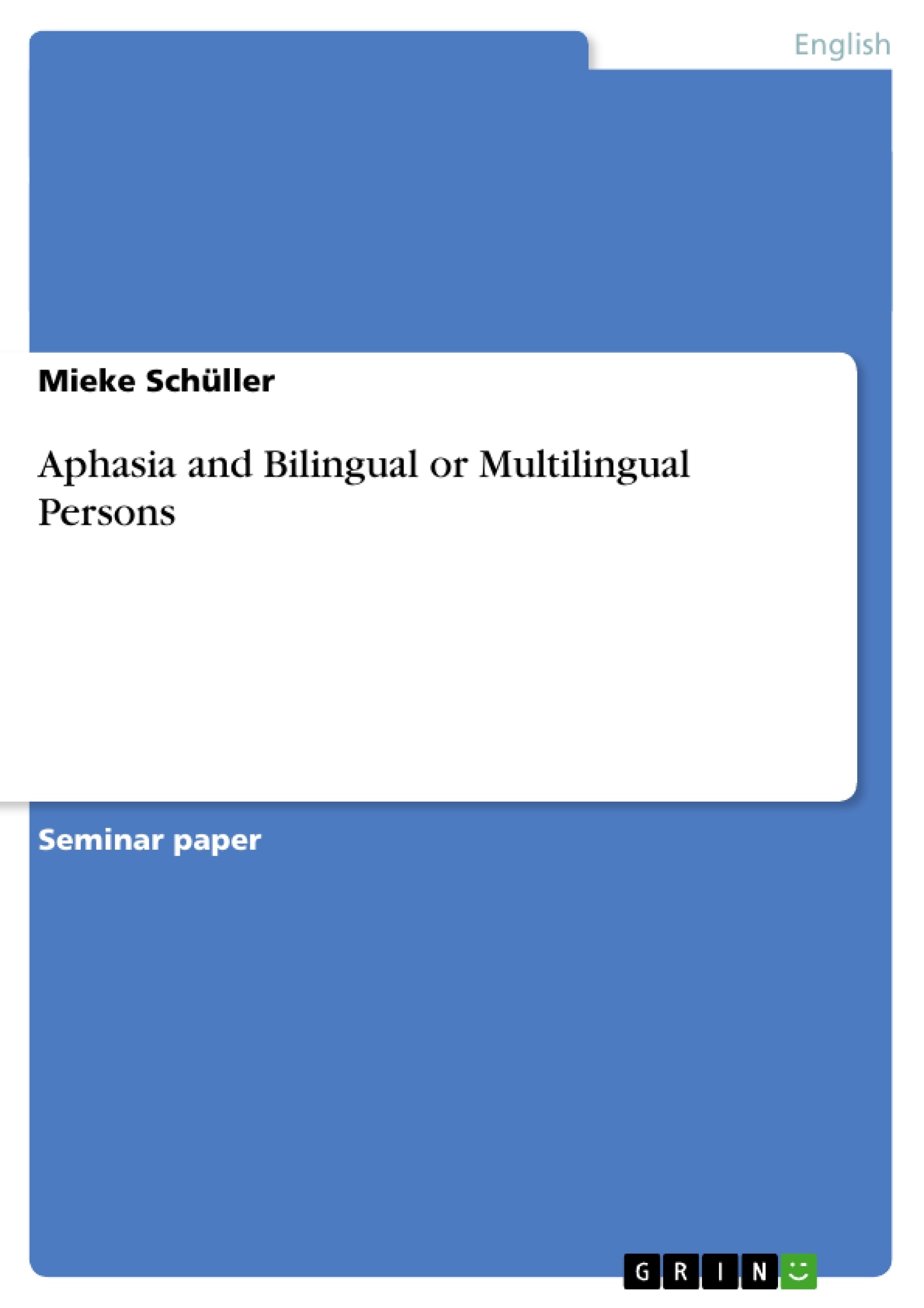Brain diseases and disorders are fields of neurology that have still not been fully examined. Neurologists are constantly facing new mysteries concerning the processes that take place on in the brain. Especially the aspect of language offers a wide spectrum for research, from the medical point of view as well as from the linguistic one. As I will concentrate on the aspect of language, or more precisely the affection of the faculty of language, which means its production and comprehension, the affection aphasia offers a good example. Aphasia is a very complex problem, and it is still not totally examined by scientific researchers and brain specialists. The field of aphasia includes many different kinds of aphasia, different clinical pictures, symptoms, and recovery patterns. At any rate, the patients have difficulties in producing or understanding language, although to different degrees. Aphasia in bilingual and multilingual persons is a field of neurology that deserves further research. It offers new aspects to the research on brain activity, and it offers the opportunity of approaching the problem of aphasia in a new way. Nevertheless, there are different, one word even contradicting theories from specialists all over the world concerning the impact of aphasia on speakers of more than one language and the reasons for it, some of which will be presented in this research paper.
As this research paper is written in order to take a closer look at the problems with language in aphasia, it is inevitable to present some medical facts and theories in order to explain the impact of aphasia on the production, understanding and recovery of language. I will start with an introduction to the physical structure of the brain, especially on the areas that are associated with language. Further on, a definition of aphasia, its causes, and a description of the different types of aphasia and their specific symptoms will be given. As the process of recovery is extremely interesting and the observation of it important because it allows us to draw conclusions on how the brain works, a section of the research paper will be devoted to this point. Moreover, the case studies of bilingual and multilingual aphasic patients offer interesting aspects for linguistic and medical research because of the possibility of understanding how language is stored in the brain, and whether different languages are stored in different parts of the brain, perhaps even in the other hemisphere.
Inhaltsverzeichnis (Table of Contents)
- 1. Introduction
- 2. A Survey of the Brain Structure and the Language Areas
- 3. Aphasia
- 3.1. A Definition of the Term Aphasia and the Causes of Aphasia
- 3.2. The Main Types of Aphasia
- 3.3. The Recovery from Aphasia
- 4. Aphasia in Bilingual and Multilingual Persons
- 4.1. Aspects of the Research on Aphasia in Bilinguals and Multilinguals
- 4.2. Different Theories of Additional Language Areas
- 4.3. The Recovery of Bilingual and Multilingual Aphasic Patients
- 5. Conclusion
Zielsetzung und Themenschwerpunkte (Objectives and Key Themes)
This research paper aims to provide a comprehensive overview of aphasia, focusing on its impact on language abilities in both monolingual and bilingual/multilingual individuals. The paper explores the brain areas associated with language processing, the different types of aphasia, and the recovery process in aphasic patients.
- The brain's structure and language areas
- The definition and causes of aphasia
- The various types of aphasia and their corresponding symptoms
- The recovery process of aphasic patients
- The effects of aphasia on bilingual and multilingual individuals
Zusammenfassung der Kapitel (Chapter Summaries)
The first chapter introduces the topic of aphasia, highlighting the complexity of the disorder and the need for further research. It emphasizes the importance of understanding the brain's structure and function, especially in relation to language processing. The second chapter provides a detailed survey of the brain structure, particularly focusing on the areas associated with language. It explores theories of localization and equipotentiality, discussing the role of different brain regions in language processing. The third chapter delves into the definition and causes of aphasia, outlining various types of aphasia and their characteristic symptoms. It also discusses the recovery process of aphasic patients, emphasizing its significance for understanding the brain's adaptability and the potential for recovery.
Schlüsselwörter (Keywords)
This research paper focuses on key concepts such as brain structure, language processing, aphasia, bilingualism, multilingualism, recovery, and the impact of aphasia on language abilities in both monolingual and multilingual individuals.
Frequently Asked Questions
What is aphasia?
Aphasia is a complex language disorder caused by brain damage (such as a stroke or injury) that affects a person's ability to produce or comprehend language, including speaking, reading, and writing.
How does aphasia affect bilingual or multilingual persons?
In multilingual patients, aphasia may affect languages differently. Some might lose their native language but retain a second language, or vice versa, depending on how and where the languages are stored in the brain.
Are different languages stored in different parts of the brain?
This is a subject of ongoing research. Some theories suggest that different languages might involve different neural pathways or even different hemispheres, while others support a more shared localization.
What are the main types of aphasia?
The main clinical types include Broca's aphasia (difficulty producing speech) and Wernicke's aphasia (difficulty understanding speech, often leading to "word salad").
Can a person recover from aphasia?
Recovery is possible and depends on the severity of the brain damage. Observing the recovery patterns, especially in multilingual patients, helps neurologists understand the brain's adaptability and plasticity.
- Citation du texte
- Mieke Schüller (Auteur), 2001, Aphasia and Bilingual or Multilingual Persons, Munich, GRIN Verlag, https://www.grin.com/document/68273



